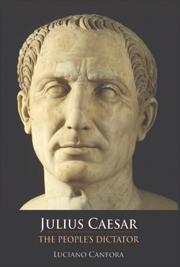Book contents
- Frontmatter
- Contents
- Translators' Note
- Acknowledgements
- Foreword
- PART I FROM SULLA TO CATILINE
- PART II FROM THE TRIUMVIRATE TO THE CONQUEST OF GAUL
- PART III THE LONG CIVIL WAR
- PART IV FROM THE CONSPIRACY TO THE TRIUMPH OF CAESARISM
- 29 Inklings of Conspiracy
- 30 ‘Iure caesus’
- 31 The Lupercalia Drama
- 32 The Dictatorship
- 33 Epicureans in Revolt?
- 34 The Hetairia of Cassius and the Recruitment of Brutus
- 35 A Conspirator's Realism: Cassius Settles for the Second Rank
- 36 Some Unexpected Refusals
- 37 Cicero – an Organiser of the Conspiracy?
- 38 The Serious Mistake of Dismissing the Escort
- 39 The Dynamics of the ‘Tyrannicide’
- 40 ‘Where's Antony?’
- 41 Caesar's Body: How to Turn Victory into Defeat
- 42 The Wind
- Chronology
- Bibliography
- Index
36 - Some Unexpected Refusals
from PART IV - FROM THE CONSPIRACY TO THE TRIUMPH OF CAESARISM
Published online by Cambridge University Press: 05 August 2013
- Frontmatter
- Contents
- Translators' Note
- Acknowledgements
- Foreword
- PART I FROM SULLA TO CATILINE
- PART II FROM THE TRIUMVIRATE TO THE CONQUEST OF GAUL
- PART III THE LONG CIVIL WAR
- PART IV FROM THE CONSPIRACY TO THE TRIUMPH OF CAESARISM
- 29 Inklings of Conspiracy
- 30 ‘Iure caesus’
- 31 The Lupercalia Drama
- 32 The Dictatorship
- 33 Epicureans in Revolt?
- 34 The Hetairia of Cassius and the Recruitment of Brutus
- 35 A Conspirator's Realism: Cassius Settles for the Second Rank
- 36 Some Unexpected Refusals
- 37 Cicero – an Organiser of the Conspiracy?
- 38 The Serious Mistake of Dismissing the Escort
- 39 The Dynamics of the ‘Tyrannicide’
- 40 ‘Where's Antony?’
- 41 Caesar's Body: How to Turn Victory into Defeat
- 42 The Wind
- Chronology
- Bibliography
- Index
Summary
Having related the reconciliation of Brutus and Cassius, Plutarch informs us that both began to get in touch with their friends. But he really only relates the steps taken by Brutus. This is not surprising, seeing that he is writing Brutus' biography, and in any case he has already said that Cassius has been busy for some time.
According to Plutarch, Brutus received only two noes: both from persons who had had very close ties to Cato and would later die at Philippi in the republican ranks – Statilius and Favonius. The latter was described in this context by Plutarch as ‘the devoted follower of Cato’, with the explanation that he was ‘more impetuous and frenzied than reasonable in his pursuit of philosophy’.
We can infer from this that Cassius had not yet approached them. The task fell to Brutus, Cato's nephew. According to the sources Plutarch uses here, Brutus – on meeting them – approached the subject indirectly, and within the framework of a philosophical debate, at which the jurist Labeo was also present. The topic of conversation must have been the best form of government, or perhaps whether monarchy was legitimate or tolerable, and the means, legitimate or otherwise, of opposing it. This much may be deduced from the answers Brutus received. Favonius, the fanatical Catonian, said that ‘civil war is worse than illegal monarchy’. Statilius was scornful, and said that ‘it did not become a wise and sensible man to be thrown into turmoil and peril for the sake of feeble and foolish folk’.
- Type
- Chapter
- Information
- Julius CaesarThe People's Dictator, pp. 314 - 316Publisher: Edinburgh University PressPrint publication year: 2007



